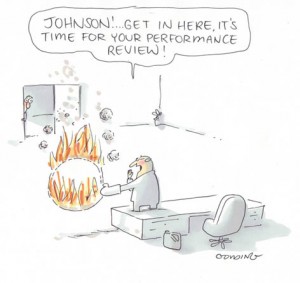 I’m sick and tired of people who talk about doing away with performance appraisals. It seems like every time you turn around there’s another article in the NY Times (Invasion of the Annual Reviews) or Forbes (Time to Scrap Performance Appraisals?) making the argument to do away with them. The usual reasons are that managers hate doing them, don’t do them in a timely manner, and that they have little, if any, connection to the actual work being done.
I’m sick and tired of people who talk about doing away with performance appraisals. It seems like every time you turn around there’s another article in the NY Times (Invasion of the Annual Reviews) or Forbes (Time to Scrap Performance Appraisals?) making the argument to do away with them. The usual reasons are that managers hate doing them, don’t do them in a timely manner, and that they have little, if any, connection to the actual work being done.
In an ideal world, managers would manage performance throughout the year, offer timely and consistent feedback (both positive and constructive), and ensure that both goals and feedback were aligned with and supported organizational goals. I think we can all agree that if this were done throughout an organization it would have a very positive impact on employee engagement, morale, productivity and the bottom line. You may also think this is about as likely to happen as an ostrich winning the Kentucky Derby or the Chicago Cubs winning the World Series.
So it seems the go-to solution is to shelve performance management and evaluations completely. But since when do we stop doing something that we know can be good for business just because it’s hard and our managers don’t like doing it?
This is what I call the dumbing down of performance management.
“It’s hard,” the manager whines. “I’m no good at it and it doesn’t do any good anyway. Make it go away.”
Excuse me?
How about instead of complaining about performance management practices and how poorly they are executed we start doing them right? How about training our managers to do their jobs better because managing the people with whom they work is the most important part of a manager’s job! Let’s start holding managers accountable for properly completing their responsibilities. If we make performance management a significant element of the manager’s performance appraisal you know they’d make sure they did this better instead of just complaining about it.
If an organization is serious about improving the performance of its workforce then it needs to send a clear message that it’s serious about performance management. Getting serious about performance management means taking the following steps:
- Have a visible champion among senior management. Someone who has the respect of his or her peers and a reputation for getting the most out of the staff.
- Implement a rigorous year-round performance management process that clearly outlines the steps a manager is expected to effectively complete at every step of the process. No “phoning it in” or “check the box” forms.
- Train managers on how to follow and implement the process. The best tool is useless, even dangerous, if people don’t know how to use it.
- Monitor both managers’ and employees’ compliance and support of the process.
- Measure the performance of the departments and their productivity as an indicator of the success with which the manager has implemented the process. Departmental performance is a more accurate indicator of a manager’s performance than the performance of any one individual. It also creates better teawork within the department.
If a process like this is in place and adhered to we’ll see a marked improvement in the performance of an organization.
So instead of complaining that performance appraisals don’t work and are a waste of time, put that same energy into developing a plan of action that actually improves performance appraisals. Let’s start doing them right.
 I was recently interviewed for an article in HR Hero, a BLR E-Zine.
I was recently interviewed for an article in HR Hero, a BLR E-Zine.

